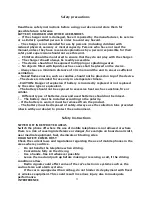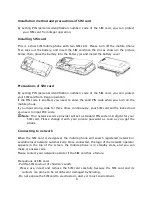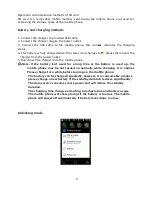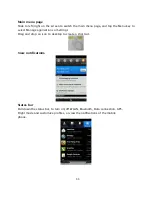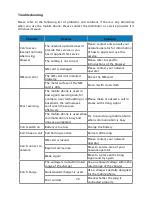
5
-Always keep wireless equipment more than 15cm away from the medical device.
-Never carry wireless equipment in a breast pocket.
-Place such equipment at the opposite ear to the medical device.
-Turn o
ff
the wireless equipment if they think it is interfering with their device
-Follow the instructions provided by the medical implant manufacturer.
If you are fitted with a medical implant and have any questions related to the use
of your mobile/wireless equipment, you should consult your doctor.
Hearing :
Warning: Using a headset risks not be able to correctly hear outside sounds. Do
not use a headset when it could endanger your safety. Some mobile devices can
interfere with the proper operation of hearing aids.
Other medical devices: Radio transmitting equipment including mobile phones may
interfere with the proper operation of insu
ffi
ciently protected medical equipment.
Consult a doctor or the medical equipment manufacturer to find out out whether
the equipment is su
ffi
ciently protected from external radio wave signals. Turn of
your device where required by regulations, particularly in hospitals.
Health facilities:
Hospitals and health facilities may be using equipment which is
particularly sensitive to external radio frequency emissions. Turn o
ff
the telephone
when sta
ff
or notices tell you to.
Blasting sites and marked areas :
Turn o
ff
your device in potentially explosive areas. Follow all o
ffi
cial instructions.
Sparks in such areas can cause an explosion or a fire, resulting in serious injury or
death. Turn o
ff
your equipment in petrol/gas stations, especially when near the
fuel pumps. Strictly follow usage restrictions in fuel depots, chemical plants or in
places using explosives.
Potentially explosive areas are often, but not always, clearly signed. These include
areas where it is normally considered advisable to turn of vehicle engines, the area
below deck on ships, chemical storage or transfer plants, and areas where the air
contains chemical products or particles, such as grain, dust and metal powder.
Check with the makers of LPG (such as propane or butane) vehicles that the device
can be used safely in their vicinity.
All our phones conform to international standards and regulations, and if need be
national ones, with a view to limiting user exposure to electromagnetic fields.
These standards and regulations were adopted after the completion of extensive
scientific research. This research established no link between the use of the
mobile phone and any adverse e
ff
ects on health if the device is used in accordance
with standard practices.
However if you would like to reduce the level of exposure to radio frequency
radiation you can follow the following rules :
- Call when reception conditions are good to lessen the amount of radiation. To do
this, avoid calling from underground car parks or when travelling by train or car.
- Call when the telephone connection is at its best (displayed by maximum bars of
network reception)
- Use a hands-free kit to ensure the phone is kept away from pregnant women’s
bellys and adolescents’ lower abdomens.



